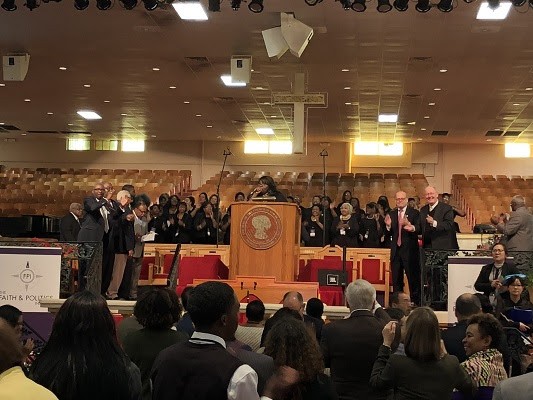
A group of about 30 congressmen began a civil rights pilgrimage at the Lorraine Motel in Memphis on Friday to commemorate the Civil Rights Movement, as well as Dr. Martin Luther King Jr.’s assassination 50 years ago.
The annual Faith and Politics Institute’s Congressional Civil Rights Pilgrimage has been going on for years, but this is the first time the group has made a stop in Memphis.
Before placing a wreath on the Lorraine Motel balcony where King was shot, the group led by Rep. John Lewis, a Democrat from Georgia, visited the Mason Temple, where King gave his final “Mountaintop” speech.
Lewis, who is an activists and was a leader of the March on Washington in 1963, said when King was killed, “something died in America,” but now the country needs to build on King’s dream.
The other stops on the pilgrimage include Selma, Montgomery, and Birmingham, Alabama.
Reps. from Memphis, David Kustoff and Steve Cohen joined the Memphis leg of the pilgrimage.
The bipartisan group was also joined by Sen. Lamar Alexander, R-Tenn, who along with Sen. Sherrod Brown, D-Ohio, introduced legislation to create the U.S. Civil Rights Network. The Lorraine Motel, where King was shot 50 years ago, will be the second site added to the network.
Alexander said he is working with Interior Secretary Ryan Zinke to make the Mason Temple a part of the network as well.
“The Lorraine Motel, as the home of the National Civil Rights Museum, helps tell the story of the civil rights movement and the people and events that shaped the country we inhabit today,” Zinke said. “The U.S. Civil Rights Network we’ve established under President Trump demonstrates our commitment to continue telling these stories for generations to come.”
Last month Sen. Alexander joined Sens. Bob Corker of Tennessee, Ben Cardin of Maryland, and Doug Jones of Alabama in introducing a resolution that recognizes the 1968 sanitation workers’ strike in the Civil Rights Movement.
Alexander said understanding the struggle with race is a key part of understanding American history.
“My first address in the United States Senate was about the importance of helping our children learn United States History so they grow up knowing what it means to be American, and there is no more essential part of understanding American history than understanding our struggle with race,” he said. “The Memphis sanitation workers’ strike and the assassination of Dr. Martin Luther King, Jr., put Memphis at the center of the Civil Rights struggle in 1968, and it’s important that we remember and understand that as part of our history.”
The Civil Rights Network Act of 2017 created the network of sites that have been found to be significant to the Civil Rights Movement. The National Park Service will work to provide technical assistance on the preservation and interpretation of the Civil Rights Movement at these sites.
Alexander said he’s seen enormous changes in the everyday lives of African Americans, an African American president, and a large number of African American mayors and legislators.
“I’ve watched Willie Herenton from Memphis go from holding a sign that says, ‘I am a man,’ to being elected to sit behind the desk of the mayor he protested back in 1968,” he said. “I’ve seen George Brown who in his first year of law practice in 1968 go from being appointed one of two black non-voting advisors to the all-white school board to being elected to the school board in 1971, and I then appointed him as the first African American justice of the Tennessee Supreme Court.”
Alexander said the country has come a long way, but “we have a long way still to go.”
“The struggle for race is not a snapshot — it is a panorama,” Alexander said. I remember very well what Reverend Ben Hooks from Memphis — who was head of the NAACP — used to say, ‘You need to remember that American is a work in progress,’ and there is no better example of a work in progress than the change in the lives of young men and women like Willie Herenton and George Brown since the sanitation workers’ strike and Dr. King’s assassination 50 years ago.”
Memphis Mayor Jim Strickland said “it’s going to take all of us” to continue the progress made since 1968.